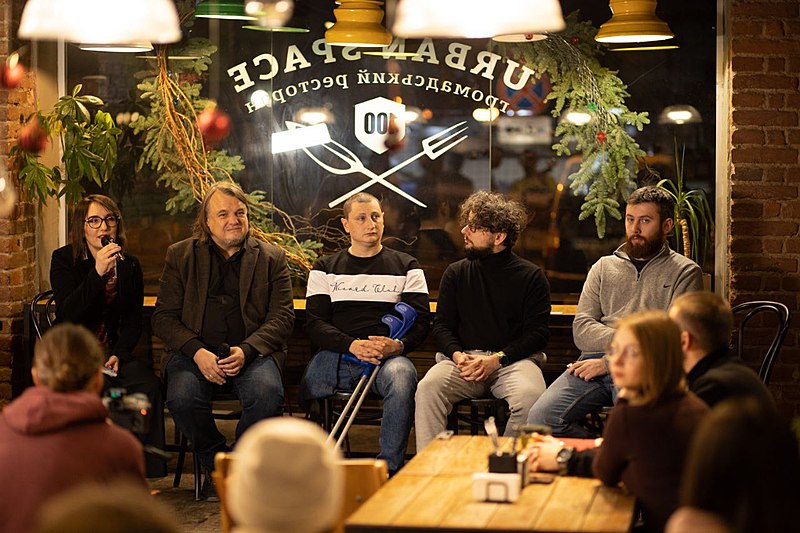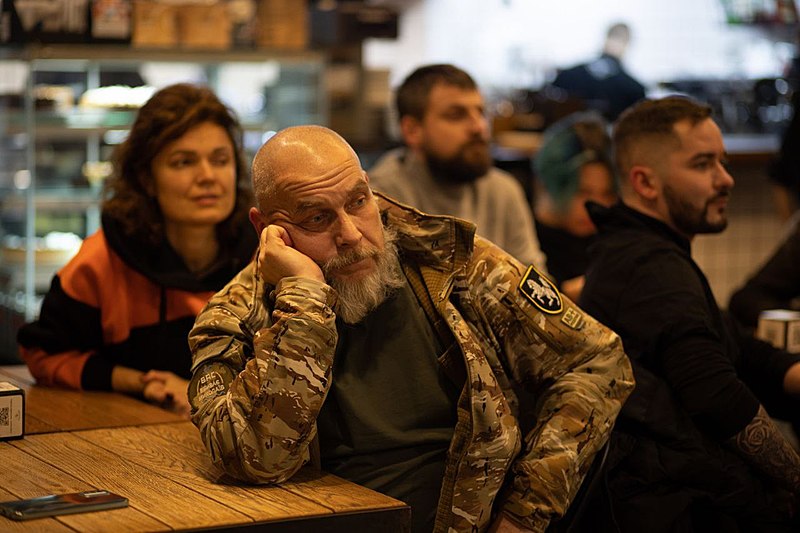
Breaking down barriers: experts and defenders talked about the reintegration of veterans in Ivano-Frankivsk
How to overcome the barriers between those who return from the front lines and those who have never fought in the war? This issue was discussed earlier at Urban Space 100 during the discussion “Reintegration of veterans. How to reduce the social gap between the military and civilians”. The event was attended by soldiers undergoing treatment at the regional clinical hospital, as well as doctors, psychologists and artists.
“Are people ready to hear and understand that, the soldiers at the front lines have had a totally different, borderline experience? Is our society willing to share the emotional burden of the defenders?” These issues were discussed by the participants and the audience.

Psychiatrist Mykhailo Pustovoit, Head of the Department of Psychiatry, Narcology and Medical Psychology of the Ivano-Frankivsk National Medical University, calls for public discussions and the development of a legal framework. Once the servicepersons see that the society recognises their contribution, their sacrifice and wishes to pay them back, it will destroy the barriers, and they will be ready to open up and turn to social and psychological services.
“The main idea,” says Mykhailo Pustovoit, “is to create an inclusive environment where every military person could find their own place. For example, we should create a Vocational Training Centre so that people who are unable to work in their previous profession anymore can change careers, earn money and be a fully functional member of society.”
Andrii Dashkevych suggests creating communities to help military personnel and their families, developing these social spaces in every city. A soldier lost his leg in the war and is waiting for prosthetics. He is hurt by comments on various media such as “We did not send you there”, “I did not sign up for the war”, etc. However, the public demand to support military personnel will help reduce barriers.
Andrii Smolenskyi, a military serviceman and commander of the air reconnaissance unit, came to discuss the topic of the adaptation of the veterans to civilian life together with his wife Alina. He has lost his eyes and hands in the war. Nevertheless, he thinks about the ways he could be useful to his brothers in arms.
Andrii warns against drawing a line between the military and civilians. According to him, most of the people who took up arms to defend their country, despite not being in the military, are the same civilians who are ready to go right back to normal life after the war.
“Those who come home from the war should be seen as normal people. They are heroes worthy of great respect, but the same respect should be given to other heroes of this war, such as medics,” says Andrii.
He warns against pitying severely wounded soldiers, calling for compassion instead, because it is “the internal engine that drives us” and “makes us human.”
What should we do? Be respectful, accepting and empathetic: if someone seems unpleasant or irritated, keep in mind what they had to go through.
Andrii Smolenskyi also has a pressing question that he does not dare to address even with his friends: if a civilian has never enlisted to fight — why is that? He claims that he is not trying to be judgemental but simply wants to understand “what the difference between us is.”
Mykola Pylypiv, a burns specialist and plastic surgeon, talked about the complex injuries treated in the Burns Department and urged society to learn to accommodate injured servicepersons. He also finds them to be better patients than civilians. They are ready to overcome difficulties and encourage each other.
Furthermore, to foster understanding and public communication, Professor Mykhailo Pustovoit suggests engaging artists. After all, he says, it will be easier for people to perceive the stories of patients when they are not as personal and told through different artistic media.

Text by: Nadiia Shehda
Photo by: Yura Palyvoda
Source: The official page of the Ivano-Frankivsk Regional Clinical Hospital on Facebook

